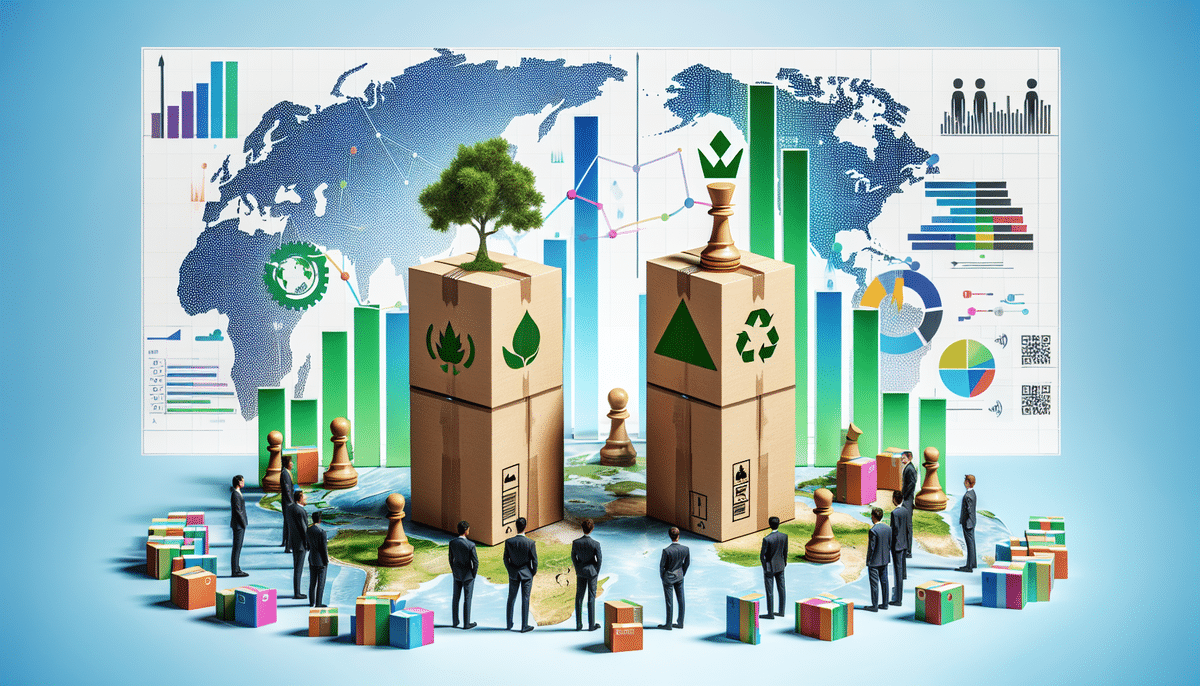Understanding the History of Georgia-Pacific and WestRock
Georgia-Pacific and WestRock are two of the most influential companies in the paper and packaging industry, each with distinct origins and growth trajectories.
Georgia-Pacific
Founded in Augusta, Georgia, in 1927 as a wholesaler of hardwood lumber, Georgia-Pacific has expanded its operations over the decades to encompass a wide range of industries related to paper, packaging, and building materials. Notable products include Brawny paper towels and Dixie cups. The company has consistently focused on innovation and sustainability, establishing itself as a leader in responsible forestry practices and the use of renewable energy sources.
WestRock
WestRock is a relatively newer entity, formed in 2015 through the merger of MeadWestvaco and RockTenn. MeadWestvaco's roots trace back to the late 19th century, while RockTenn was established in the 1930s as a box-making business. WestRock has solidified its presence in the corrugated packaging market, emphasizing sustainable packaging solutions and expanding its global footprint through strategic acquisitions.
Current Market Positions of Georgia-Pacific and WestRock
As of 2023, both Georgia-Pacific and WestRock remain dominant players in the paper and packaging sector, each leveraging their strengths to maintain and grow their market share.
Georgia-Pacific's Market Standing
Georgia-Pacific is recognized as one of the largest privately held companies in the United States, with estimated annual revenues surpassing $21 billion.[1] The company's diverse portfolio includes consumer products like paper towels and napkins, as well as building materials and chemicals, allowing for a resilient business model.
WestRock's Market Presence
WestRock, with a market capitalization exceeding $12 billion and a global workforce of over 50,000 employees,[2] focuses primarily on industrial packaging and corrugated products. The company's strategic acquisitions, including KapStone Paper and Packaging, have significantly bolstered its product offerings and market reach.
Financial Performance of Georgia-Pacific and WestRock
The financial trajectories of Georgia-Pacific and WestRock reflect their strategic decisions and adaptability in a fluctuating market.
Revenue and Profitability
Both companies experienced revenue declines in 2020 due to the COVID-19 pandemic but have shown signs of recovery in subsequent years.[3] Georgia-Pacific has focused on debt reduction and sustainable investments, while WestRock has pursued growth through acquisitions, impacting their respective financial health differently.
Investment Strategies
- Georgia-Pacific: Emphasizes reducing debt and investing in sustainable practices, such as renewable energy and waste reduction.
- WestRock: Prioritizes growth through strategic acquisitions and expanding its product portfolio.
Key Products and Services Offered by Georgia-Pacific and WestRock
Both companies offer a broad spectrum of products and services tailored to various industries and consumer needs.
Georgia-Pacific's Offerings
- Tissue products, including toilet paper and paper towels
- Corrugated packaging solutions
- Building materials
- Pulp and specialty chemicals like adhesives, resins, and coatings
WestRock's Product Range
- Paperboard packaging and containers
- Consumer packaging for food and beverage, healthcare, and beauty industries
- Eco-friendly packaging materials made from renewable resources such as bamboo and sugarcane
- Recycling programs to minimize environmental impact
Management Styles and Corporate Cultures
The management approaches and corporate cultures of Georgia-Pacific and WestRock significantly influence their operational effectiveness and employee satisfaction.
Georgia-Pacific
Georgia-Pacific employs a decentralized management structure, granting significant autonomy to individual business units. This approach fosters innovation and responsiveness to market changes. The company's culture emphasizes safety, sustainability, and responsible forestry practices.
WestRock
In contrast, WestRock utilizes a more centralized management structure, promoting collaboration and teamwork across departments and regions. The company values diversity and inclusion, implementing initiatives aimed at achieving gender and racial equality within the workplace.
Mergers and Acquisitions Impact
Strategic mergers and acquisitions (M&A) have been pivotal in shaping the competitive landscape of the paper and packaging industry.
WestRock's M&A Strategy
WestRock's merger with MeadWestvaco and RockTenn in 2015 created a formidable entity in the packaging sector. Subsequent acquisitions, including Multi Packaging Solutions and KapStone Paper and Packaging,[4] have expanded its product offerings and market presence. However, these acquisitions have also increased the company's debt load.
Georgia-Pacific's Acquisitions
Georgia-Pacific has strategically acquired companies like Buckeye Technologies and Guardian Industries to diversify its product portfolio and enter new markets. These acquisitions have enabled the company to enhance its tissue products and expand into glass manufacturing.
Supply Chain Management Strategies
Effective supply chain management is crucial for the operational success of both Georgia-Pacific and WestRock.
Georgia-Pacific's Approach
Georgia-Pacific focuses on sustainable forestry and responsible sourcing of raw materials, which not only reduces environmental impact but also strengthens consumer trust. The company's investment in renewable energy and waste reduction further enhances its supply chain resilience.
WestRock's Strategy
WestRock prioritizes waste reduction and energy efficiency within its manufacturing processes.[5] By optimizing logistics and leveraging advanced technology, WestRock ensures a streamlined and efficient supply chain capable of adapting to global market demands.
Sustainability Practices
Both companies are committed to sustainability, recognizing its importance for long-term viability and consumer preference.
Georgia-Pacific's Sustainability Goals
- Committed to reducing greenhouse gas emissions by 30% by 2030
- Investments in renewable energy sources
- Implementation of responsible forestry practices
WestRock's Sustainability Initiatives
- Aims to use 100% recycled or sustainably sourced materials in products by 2025
- Development of biodegradable and compostable packaging materials
- Comprehensive recycling programs to minimize waste
Future Trends in the Paper and Packaging Industry
The paper and packaging industry is undergoing significant transformations driven by technological advancements and shifting consumer behaviors.
Emerging Trends
- E-commerce Packaging: Increased demand for durable and efficient packaging solutions tailored for online retail.
- Sustainable Packaging: Growth in eco-friendly packaging options made from renewable resources and designed for recyclability.
- Digital Transformation: Adoption of digital printing, data analytics, and automation to enhance customization and operational efficiency.
Company Positioning
Georgia-Pacific and WestRock are strategically positioned to capitalize on these trends. Georgia-Pacific's diverse product range and commitment to sustainability align well with consumer demands, while WestRock's focus on innovation and technological integration ensures it remains at the forefront of industry advancements.
Legal Disputes and Antitrust Challenges
Operating on a large scale, both Georgia-Pacific and WestRock have encountered various legal challenges over the years.
Georgia-Pacific
In 2019, Georgia-Pacific was ordered to pay $21 million in damages related to contaminated groundwater in North Carolina.[6] The company continues to address environmental compliance and regulatory standards to mitigate future legal risks.
WestRock
WestRock has faced lawsuits and investigations concerning alleged price fixing in the packaging industry and environmental violations.[7] The company actively engages in legal compliances and ethical business practices to uphold its reputation and operational integrity.
Industry Expert Insights
Consulting industry experts provides a deeper understanding of the competitive dynamics and strategic positioning of Georgia-Pacific and WestRock.
Positive Perspectives
Experts commend both companies for their robust brand recognition, adaptability to market changes, and leadership in sustainability.
Critical Views
Critics highlight the industry's environmental impact and call for greater diversity in ownership and leadership roles. Continuous improvement in these areas is essential for long-term sustainability and market acceptance.
Marketing Strategies
Effective marketing is essential for building brand recognition and consumer loyalty in the competitive paper and packaging industry.
Georgia-Pacific's Marketing Efforts
Georgia-Pacific leverages social media campaigns and celebrity endorsements to promote products like Brawny paper towels and Dixie cups. These strategies enhance consumer engagement and brand visibility.
WestRock's Promotional Tactics
WestRock emphasizes the quality and durability of its packaging solutions through slogans like "Packaging that performs" and "Built to last." The company also highlights its commitment to sustainability in its marketing initiatives.
Technological Advancements Impact
Technological innovation plays a critical role in enhancing operational efficiency and product offerings in the paper and packaging sector.
Georgia-Pacific's Technological Initiatives
Georgia-Pacific has developed innovative products such as the "smart diaper," which utilizes sensors to monitor infants' health. These advancements demonstrate the company's commitment to integrating technology with traditional manufacturing.
WestRock's Technological Investments
WestRock has introduced digital printing systems that allow for highly customized packaging designs, meeting the demand for personalized consumer experiences. Additionally, the company invests in data analytics and automation to optimize its production processes.
Opportunities for Collaboration or Partnership
Despite being competitors, there are potential areas where Georgia-Pacific and WestRock could collaborate for mutual benefit and industry advancement.
Sustainability Initiatives
Both companies are involved in recycling and waste reduction initiatives. Collaborative efforts in this area could enhance the effectiveness and reach of their sustainability programs.
Renewable Energy Investments
Shared knowledge and resources in renewable energy could lead to more efficient and impactful sustainability practices, benefiting both companies and the broader environment.
Conclusion
Georgia-Pacific and WestRock are formidable leaders in the paper and packaging industry, each with unique strengths and strategic approaches. While Georgia-Pacific boasts a diversified product portfolio and decentralized management, WestRock excels in industrial packaging and centralized operations. Both companies are committed to sustainability and innovation, positioning themselves well to navigate future industry trends and challenges. Continued adaptability and strategic investments will be key to maintaining their competitive edge in a dynamic market landscape.
For more insights and detailed industry reports, visit ShipScience.




















